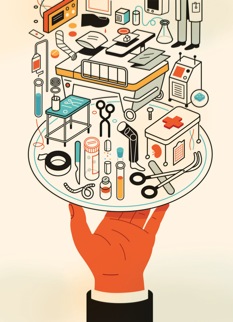By Vanessa Radatus
This week, The New Yorker presents a fascinating article that delves into heart of what our health care system needs. Using The Cheesecake Factory as a model, American physician and journalist, Atul Gawande, provides refreshing insight as to how hospitals could learn a thing or two from this service savvy business. After all, who wouldn’t want a healthcare model that guarantees 100% satisfaction with quality and service, all at an affordable price?
Atul Gawande says it nicely: “In medicine, too, we are trying to deliver a range of services to millions of people at a reasonable cost and with a consistent level of quality. Unlike the Cheesecake Factory, we haven’t figured out how. Our costs are soaring, the service is typically mediocre, and the quality is unreliable. Every clinician has his or her own way of doing things, and the rates of failure and complication (not to mention the costs) for a given service routinely vary by a factor of two or three, even within the same hospital.”
So, what can we learn from these flourishing businesses that continue to serve millions while managing efficiency, quality, and cost? For one, we must accept that whether we agree with recent health laws or not, our system needs a new model and fast. With trillion-dollar healthcare costs only getting higher and a shortage of doctors to treat 30 million newly insured Americans, utilizing key business strategies from successful chains like The Cheesecake Factory may not be a bad idea.
In his article, “Restaurant Chains have Managed to Combine Quality Control, Cost Control and Innovation. Can Health Care?” Gawande takes a close look inside of The Cheesecake Factory’s strategies to see how the business makes $1.2 billion in yearly revenue while maintaining affordable, high-quality products that always leave customers smiling. He explains that the success secrets behind the business is that instructions are precise, objectives are clear and oversight is tight. “The formula was Business 101: Use the right amount of goods and labor to deliver what customers want and no more. Anything more is waste, and waste is lost profit,” Awande stated.
If our hospitals aimed to reach the same amount of quality, efficiency and positive outcomes as these enterprises do, our healthcare system would not be in its current crisis. Awande proves a good point when he asked Dave Luz, Regional Manager of eight L.A. Cheesecake Factory’s, what he would do if he were manager of a neurology or cardiology unit in a hospital:
“This is pretty obvious. I’m sure you already do it. But I’d study what the best people are doing, figure out how to standardize it, and then bring it to everyone to execute.”
Unfortunately, this is not how medical care works. But new health-care chains are now hoping to do this on a mass scale, Awande says.
“They want to create Cheesecake Factories for health care. The question is whether the clinicians in the operating rooms, in the medical offices, in the intensive-care units—will go along with the plan. Fixing a nice piece of steak is hardly of the same complexity as diagnosing the cause of an elderly patient’s loss of consciousness. Doctors and patients have not had a positive experience with outsiders second-guessing decisions. How will they feel about managers trying to tell them what the “best practices” are?”
After a lengthy yet intriguing look into both the medical and food industry, Awande ends with this final thought for readers: ”
“The critical question is how soon that sort of quality and cost control will be available to patients everywhere across the country. We’ve let health-care systems provide us with the equivalent of greasy-spoon fare at four-star prices, and the results have been ruinous. The Cheesecake Factory model represents our best prospect for change. Some will see danger in this. Many will see hope. And that’s probably the way it should be.” Read More…
Atul Awande is a highly respected physician and journalist. His writings on the process and practice of healthcare are important. His book “The Checklist Manifesto” is a must read for anyone concerned about health care and hospital quality.


Leave a Reply